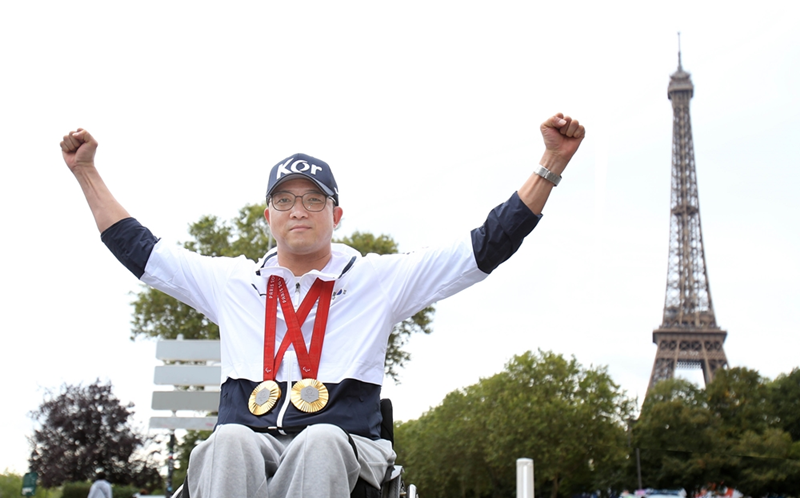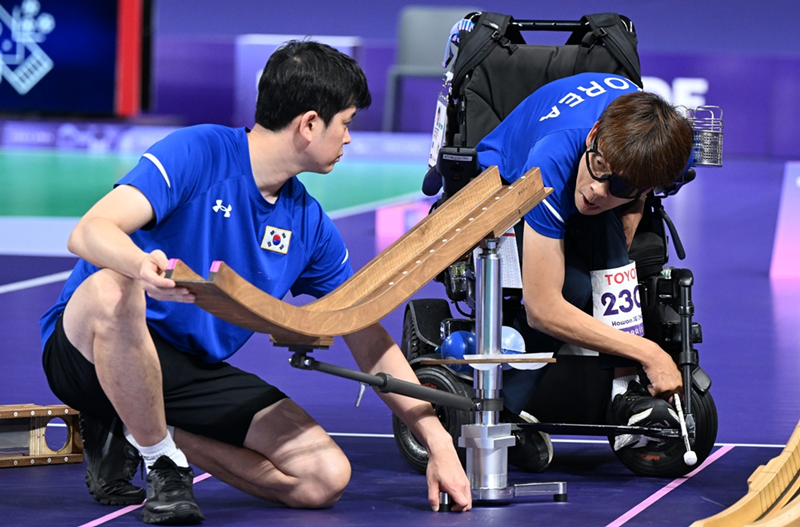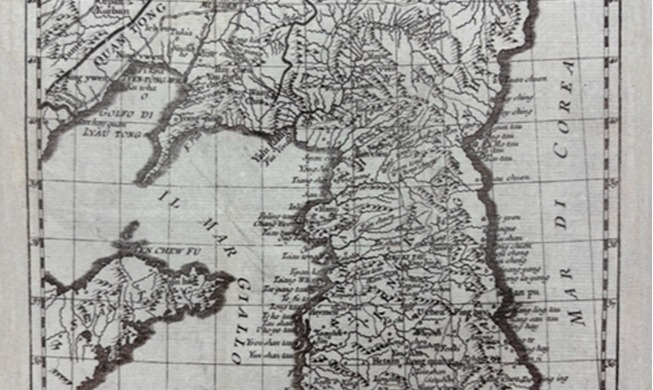The national team won six gold, 10 silver and 14 bronze medals at this year's Paris Summer Paralympics to finish 22nd overall. The athletes displayed determination, courage and excellence to achieve remarkable feats in an array of events.
They both inspired and stirred emotions within Koreans in addition to making their nation proud. Korea.net interviewed four Paralympians who exceeded their limitations to redefine the limits of human potential and hear their journeys of challenge and growth. The first installment of this series features record-breaking shooter Park Jinho and boccia star Jeong Howon, who won Korea's 10th consecutive gold in the sport.
By Gil Kyuyoung and Hong Angie
Photos = Korea Paralympics Committee
※ Shooting's poster boy: Park Jinho

Park Jinho, who won two gold medals in shooting at this year's Paris Summer Paralympics, on Sept. 9 poses wearing his honors with the Eiffel Tower in the background.
"I just believed in myself and got enough rest to maintain my best physical condition." This was the secret behind shooter Park Jinho's exceptional feat at the Paris Summer Paralympics.
He honed his passion for sports to turn into a "wheelchair-bound sniper" and went beyond simple victory to touch and inspire many people.
At age 25 while attending a physical education college, Park suffered a spinal cord injury in a fall and was left a paraplegic. Shocked, he gave up his hopes and dreams.
During his rehabilitation, he visited the social welfare department of the Sinchon-dong branch of Severance Hospital in Seoul to see what sports he could pursue given his disability.
Among many options, he was most attracted to shooting and decided on it. At the time, he never dreamed that this sport would become his reason for existence.
"Now, I can't imagine life without shooting," he said in expressing his love for the event. "Shooting is part of my life and the impetus that sustains me."
Shooting requires a strong focus and tough mentality, making routine crucial. Park said the key to success is "repetition without a mistake from the moment you hold the gun until you fire it."
On the biggest appeal of shooting, he said, "If the movement is made normally and the bullet goes off the moment you fire it, you intuitively know the direction and score. This is what shooters call a 'tracking prophecy.' A chill goes through my entire body the moment when my tracking intuition precisely matches the bullet hitting the target."
"It's hard to describe in words the joy I feel when concentration and precision exactly align in that moment."
In shooting, Park broke records in taking the gold in both the R1 men's 10-m standing air rifle (SH1) and R7 50-m three positions rifle. He said his achievements would have been impossible without the consideration and support from the people around him.
This is why his happiest moment was winning his first gold.
On if he felt his emotions from that time, he said with a wide grin, "At that moment, I felt all my efforts and the support of the people around me come to fruition."
On dreams he wants to achieve, he added, "I won the gold but want to be remembered by many as a player who continues to improve."
This might have started when Park was named MVP at the ceremony for the national team's disbandment.
Emperor of boccia: Jeong Howon

Paralympian icon Jeong Howon on Sept. 2 won the men's individual BC3 boccia title over Daniel Michel of Australia at South Paris Arena 1 in the French capital.
The national boccia team made history at the Paris competition after Jeong Howon claimed Korea's 10th straight gold in the men's individual BC3 event.
"As the skills of boccia players have recently grown similar, I didn't expect to win the gold medal so easily," he said. "But my confident and decisive play helped."
As a child, Jeong fell from his bed and suffered from cerebral palsy. Starting boccia at age 12 due to a recommendation from his physical education teacher gave him new life. Competing in five consecutive Paralympics since Beijing 2008 (China), he owns a record-high seven medals in the competition -- four gold, two silver and one bronze -- to earn the moniker "boccia legend."
As a Paralympic sport specifically for people with cerebral palsy, boccia features six red and six blue balls thrown into a court 6 m wide and 12.5 m long. The score is based on throwing balls that land closest to the white target ball.
BC3 is for athletes who struggle to move their bodies and requires assistants or auxiliary devices. "Assistants adjust the height, angle and direction of the gutter based on instructions from their athletes," Jeong said, "They cannot talk to their athletes or look back during a game."
The world No. 1 suffered a slump last year. As the percentage of boccia players who did not have cerebral palsy increased in his event, he wondered if he could survive.
"The person who gave me the most strength at that time was my assistant and friend, coach Kim Seung-kyum," Jeong said. "My performance greatly improved after he and I studied and experimented with boccia."
So what has driven Jeong in his sport for over 20 years? "I had no option in life other than boccia," he said. "I could continue my life as an athlete thanks to both material and emotional support from many people."
"I want to go beyond boccia to become a symbol of the Paralympics."
